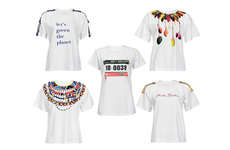
These T-shirts Will Change Color Based on Your City's Water Pollution
Ellen Smith — June 8, 2017 — Eco
References: fastcodesign & wired
These pollution-reacting t-Shirts will change color in the wash based on your city's pollution levels. London-based material design studio, The Unseen, has always experimented with the infusion of color changing technology, dabbling with color-changing hair dye and hypercolor fashion pieces.
The color-obsessed designers at The Unseen collaborated with British life style company, the Lost Explorer, to develop shirts that will look differently in Toronto, than they do in New York. The shirts are made with cabbage juice, a natural pH indicator that will turn red, pink, or magenta in acids and blue and yellow in alkaline solutions. The colors of the t-shirts range on a scale of dark purple, to royal blues, and faded pastels.
These pollution-reacting t-shirts stand as a reminder of the important role fashion can take with regards to important issues like environmental sustainability.
The color-obsessed designers at The Unseen collaborated with British life style company, the Lost Explorer, to develop shirts that will look differently in Toronto, than they do in New York. The shirts are made with cabbage juice, a natural pH indicator that will turn red, pink, or magenta in acids and blue and yellow in alkaline solutions. The colors of the t-shirts range on a scale of dark purple, to royal blues, and faded pastels.
These pollution-reacting t-shirts stand as a reminder of the important role fashion can take with regards to important issues like environmental sustainability.
Trend Themes
1. Pollution-reacting Textiles - Opportunity for textile companies to develop pollution-reacting materials for various apparel.
2. Color-changing Technology - Innovative products can be developed using color-changing technology such as hair dye and fashion pieces.
3. Environmental Sustainability Fashion - Fashion companies can focus on producing sustainable products that create awareness about environmental issues.
Industry Implications
1. Textile Industry - Textile companies can collaborate with environmentalists to produce sustainable clothing using pollution-reacting materials.
2. Consumer Goods Industry - Consumer goods companies can explore color-changing technology to create innovative and eco-friendly products.
3. Fashion Industry - Fashion companies can take up the responsibility to create environmental awareness and sustainable products to customers.
4.2
Score
Popularity
Activity
Freshness























